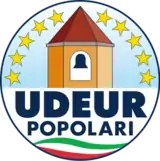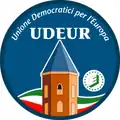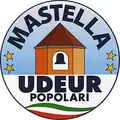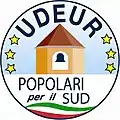Union of Democrats for Europe
The Union of Democrats for Europe (Italian: Unione Democratici per l'Europa, UDEUR), also known as UDEUR Populars (Popolari UDEUR),[2][3] was a minor centrist, Christian-democratic political party in Italy.
Union of Democrats for Europe Unione Democratici per l'Europa | |
|---|---|
 | |
| Leader | Clemente Mastella |
| Founded | 23 May 1999 |
| Dissolved | 24 November 2013 |
| Preceded by | Democratic Union for the Republic |
| Merged into | Forza Italia |
| Headquarters | Largo Arenula, 34 00186 Rome |
| Newspaper | Il Campanile |
| Membership | unknown |
| Ideology | Christian democracy[1] |
| Political position | Centre |
| National affiliation | The Daisy (2001–2002) The Union (2005–2008) The People of Freedom (2009–2013) |
| European affiliation | European People's Party (1998–2015) |
| International affiliation | Centrist Democrat International (1998–2015) |
| European Parliament group | European People's Party (1998–2014) |
| Website | |
| www | |
Led by Clemente Mastella, minister of Labour in Berlusconi I Cabinet (1994–1995), minister of Justice in Prodi II Cabinet (2006–2008) and current mayor of Benevento (since 2016), the party has been at times very strong in Southern Italy, but almost irrelevant in Northern Italy. After a decline in terms of popularity in 2007–2008, the party resisted only in Campania, Mastella's heartland, and few other regions. The party was briefly revived in the run-up of the 2018 general election.
History
Early years
The UDEUR emerged in May 1999 at the breakup of the Democratic Union for the Republic (UDR). This party had been founded in June 1998, under the leadership of Francesco Cossiga, by the merger of Rocco Buttiglione's United Christian Democrats, Mastella's Christian Democrats for the Republic (a splinter group from the Christian Democratic Centre), the Segni Pact and splinters from Forza Italia, National Alliance and Lega Nord. At its foundation, the UDEUR included a minister in Massimo D'Alema's government, Salvatore Cardinale at the ministry of Communications.
At its electoral debut at the 1999 European Parliament election, the party received 1.6% of the vote, having its strongholds in the South (5.1% in Campania, 3.4% in Basilicata, 4.4% in Calabria and 7.1% in Sicily).
In the run-up to the 2001 general election the UDEUR joined the Democracy is Freedom – The Daisy (DL) electoral list, along with the Italian People's Party, The Democrats and Italian Renewal. Under the leadership of Francesco Rutelli, who ran also as leader of the entire The Olive Tree centre-left coalition, DL gained 14.6% of the vote. The list's success led to a debate over forming a joint party. When DL was effectively transformed into a party in early 2002, the UDEUR refused to join and remained an independent party within the centre-left.
Heyday
In 2004 the party changed its official name to UDEUR Populars and amended its symbol accordingly (it would later go back to its original name).
At the 2004 European Parliament election UDEUR achieved 1.3% of the national vote (5.4% in Campania, 4.0% in Basilicata, 3.8% in Calabria and 2.7% in Sicily), enough to elect an MEP, who sat in the European People's Party – European Democrats (EPP–ED) group.
At the 2005 regional elections the party had its best result ever, having scored 10.3% in Campania, 11.1% in Basilicata and 8.7% in Calabria.
Toward the end of the 2001–06 parliamentary term, Mastella decided to continue the alliance with the centre-left, although he and his party were in conflict with the secularist policies proposed by the new coalition partner Rose in the Fist and despite the presence of far-left parties such as the Communist Refoundation Party. At the 2006 general election the UDEUR was part of The Union centre-left coalition in support of Romano Prodi. It obtained 1.4% of the vote, electing 14 deputies (4 in The Olive Tree's list) and 3 senators. The Union won the election, and Mastella was appointed Minister of Justice in Romano Prodi's second government.
The fall
On 16 January 2008 Clemente Mastella, who was under investigation by prosecutor Luigi de Magistris, resigned as Minister of Justice and on 21 January decided to withdraw his party's support to Romano Prodi, who himself resigned after a vote of confidence in the Senate on 24 January, clearing the way toward a snap election.
In the following weeks the party suffered several splits leading to several regional parties, notably the Democratic Populars[4] in Campania, the United Populars[5] in Basilicata and the Sardinian Autonomist Populars[6][7] in Sardinia, while the Umbrian regional section joined Christian Democracy. Most leading members, including Antonio Satta (who would later launch the Christian Popular Union), Stefano Cusumano, Mauro Fabris, Armando Veneto and Tommaso Barbato, left.
At the 2008 general election both The People of Freedom (PdL) and the Union of the Centre (UdC) refused the UDEUR as coalition partner. The party was thus reduced to a regional party in Campania. The party chose not to present any list in the election and even Mastella decided not to run for re-election.[8]
After the fall
In February 2009 the UDEUR formed an alliance with the PdL in Campania; under the agreement, the UDEUR supported centre-right candidates in the 2009 provincial and municipal elections in the region[9] and Mastella was elected to the 2009 European Parliament election in the PdL list.
After being almost disbanded in 2008, the party tried to recover and broaden its base. Some former UDEUR members came back[10] and new members joined. The latter included Giulio Di Donato, a former leading figure of the Italian Socialist Party, who was appointed regional secretary in Campania.[11] In 2010 the party was briefly known as Populars for the South,[3][12] as it was active only in the South by that time. In 2011 Mastella ran for mayor of Naples and gained just 2.5% of the vote.[13]
In 2013, the UDEUR became an associate party of Forza Italia (FI).[14][15] At the 2014 European Parliament election Mastella, a candidate with FI, was not re-elected.
Re-foundation
The party was revived in the run-up of the 2018 general election, in alliance with the Union of the Centre (UdC), and re-styled once again its symbol.[16][17][18][19] However, Mastella later formed a new pact with FI, under which his wife would run in the election, and in February 2018 they officially joined FI.[20][21]
In 2020, Mastella re-branded the party under the name Us Campanians, taking part in the 2020 Campania regional election in support of the Democratic governor, Vincenzo De Luca.
Electoral results
Italian Parliament
| Chamber of Deputies | ||||||
| Election year | Votes | % | Seats | +/− | Leader | |
|---|---|---|---|---|---|---|
| 2001 | into The Daisy | – | 7 / 630 |
Clemente Mastella | ||
| 2006 | 534,088 (11th) | 1.4 | 10 / 630 |
|||
| Senate of the Republic | ||||||
| Election year | Votes | % | Seats | +/− | Leader | |
|---|---|---|---|---|---|---|
| 2001 | into Ulivo | – | 4 / 315 |
|||
| 2006 | 477,226 (11th) | 1.4 | 3 / 315 |
|||
European Parliament
| European Parliament | ||||||
| Election year | Votes | % | Seats | +/− | Leader | |
|---|---|---|---|---|---|---|
| 1999 | 498,742 (14th) | 1.6 | 1 / 87 |
|||
| 2004 | 419,173 (12th) | 1.3 | 1 / 78 |
|||
| 2009 | into PdL | – | 1 / 72 |
|||
| 2014 | into Forza Italia | – | 0 / 73 |
|||
Leadership
- Secretary: Clemente Mastella (1999–2013)
- Deputy Secretary: Stefano Cusumano (1999–2005), Antonio Satta (2005–2008), Marco Di Stefano (2007–2008)
- Coordinator: Mauro Fabris (1999–2006)
- President: Irene Pivetti (1999–2002), Ida Dentamaro (2002–2004), Mino Martinazzoli (2004–2005), Lorenzo Acquarone (2005–2006), Federica Rossi Gasparrini (2007–2008), Marilina Intrieri (2009–2010)
- Administrative Secretary: Tancredi Cimmino (1999–2006), Mauro Fabris (2006), Pier Paolo Sganga (2006–2008)
Symbols
 1999–2003
1999–2003 2004–2006
2004–2006 2006–2010,
2006–2010,
2012–2015 2011–2012
2011–2012
References
- Nordsieck, Wolfram (2008). "Italy". Parties and Elections in Europe. Archived from the original on 12 June 2009. Retrieved 20 April 2019.
- Statuto
- Thomas Jansen; Steven Van Hecke (19 May 2011). At Europe's Service: The Origins and Evolution of the European People's Party. Springer Science & Business Media. p. 65. ISBN 978-3-642-19414-6.
- Caserta Sette - informazione - news - attualitŕ - cronaca - sport - turismo - musica e arte - reggia di caserta - giornalisti - giornalismop - attualitŕ - omicidi - rapine - s...
- "Archived copy". Archived from the original on March 15, 2008. Retrieved March 11, 2008.CS1 maint: archived copy as title (link)
- http://notizie.alice.it/notizie/politica/2008/03_marzo/01/sardegna_udeur_sardo_abbandona_mastella_nasce_il_pas,14186035.html%5B%5D
- «Con Mastella chiuso ogni contatto»E l'ex ministro: «Udeur sola in tutt'Italia» Corriere della Sera
- La resa di Mastella "Non mi presento" - Politica - Repubblica.it
- Mastella candidato alle europee con il Pdl Pronto il ribaltone Udeur in Campania
- Del Mese: «Ho lasciato Pionati per tornare da Mastella» - Corriere del Mezzogiorno
- Mastella nomina Giulio Di Donato segretario regionale del Campanile - Corriere del Mezzogiorno
- «Rinuncio all' Isola dei famosi»
- "Archived copy". Archived from the original on May 18, 2011. Retrieved May 20, 2011.CS1 maint: archived copy as title (link)
- «Con Forza Italia da moderati» Il sì dell’Udeur a Berlusconi Archived December 6, 2013, at the Wayback Machine
- Mastella: «Voli di Stato, Boldrini linciata come me quando andai a Monza» - Corriere del Mezzogiorno
- http://www.ansa.it/campania/notizie/2017/12/16/a-napoli-mastella-presenta-udeur-2_0684a7dc-45aa-448f-ad29-36f9667703b9.html
- http://www.adnkronos.com/fatti/politica/2017/12/16/mastella-riprova-nasce-udeur_DKfvcKox7ShNehqAjXOaLL.html
- https://www.ilfattoquotidiano.it/2017/12/16/elezioni-mastella-resuscita-ludeur-con-pomicino-e-cesa-senza-di-noi-il-centrodestra-non-arriva-al-40/4043340
- http://www.ilgiornale.it/news/politica/e-mastella-fa-risorgere-ludeur-1474867.html
- http://napoli.repubblica.it/cronaca/2018/02/03/news/napoli_mastella_aderisce_a_forza_italia-187942606
- http://www.ilgiornale.it/news/politica/mastella-entra-ufficialmente-forza-italia-1490588.html